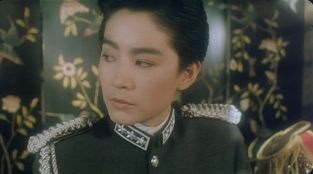« Coffee Break | Main | The Aimed School »
July 13, 2010
The Last Star of the East

Peking Opera Blues
The Last Star of the East: Brigitte Lin Ching Hsia and her Films
Akiko Tetsuya - 2005
By nature, I am not the feminine, tender kind. My family tree originated in Shandong Province in China. I guess that must be in my blood. People from Shandong are reputed to be very tough people, trained by the severe weather there. So there is a toughness in me. - Brigitte Lin
One thing that virtually everyone interviewed in the book agrees on is that Brigitte Lin's best performance is that of the magical, androgynous Asia the Invincible in Swordsman II. It will probably be argued by some, myself included, that if there is to be a character named Asia the Invincible, who else is better suited for the part? Brigitte Lin could not be described as conventionally attractive, but in some ways may be more similar to some of the Hollywood actresses that emerged in the Thirties, such as Bette Davis and Barbara Stanwyck, who command the attention of the viewer, sometimes simply be their very presence onscreen.

Web of Deception
There are some nuggets of information in this self published book. The substance is less than what I would have hoped for. The book is an assemblage of interviews that occasionally falls into fangirl gush. Akiko Tetsuya might have benefitted from an editor who would have whittled away some of the more redundant passages regarding Lin's kindness to her friends, and her happiness as a self-identified housewife.
Someone, if not on the level of Patricia Bosworth with Montgomery Clift, perhaps on the level of Lee Server's look at Ava Gardner, could fashion a more interesting biography. The apocryphal origin of Lana Turner's screen career has nothing on Lin. With her last year of high school not yet finished, the young Taiwanese Lin Ching Hsia was recruited on the street to play the part of a girl her own age in a movie. After the filmmakers viewed tests with several girls, Lin was chosen to play the lead in her first movie. Not only had Lin not thought about a career as an actress prior to her first performance, but the film, from a fictionalized biography of a Taiwanese writer, was blocked from theaters in her own country. Nonetheless, Outside the Window was successful enough within the other Chinese language markets where it played. Following that film's release, Lin was a star, first in Taiwan based productions, eventually working primarily for Hong Kong based filmmakers in the productions that made her known internationally.
What can be gleamed from the interviews is that the first decade of filmmaking for Brigitte Lin was demanding, both physically and emotionally. Not only was Lin making between five to six movies per year, but her frequent costar was Chin Han, a married actor with whom she had a long-term relationship. Other than some mentions of how important Chin was to Lin, one reads that tempestuous off screen behavior never intruded when the two were filming. The most salacious act mentioned by Lin is of going to a nude beach with the much shyer Teresa Teng. What I found frustrating is that for a book that proclaims itself to be about the films covers only a handful of the one hundred movies made between Outside the Window and Ashes of Time.
That Lin starred in one hundred movies within a twenty-two year period is staggering. That a more thorough examination of those films might be in order would be of considerable help in scholarship regarding Chinese language films. While a fair amount of Brigitte Lin's Hong Kong work is available on subtitled DVDs, the major portion of her early work is more difficult to see. Some of the early films that are available are on VCD only, and many titles are not subtitled. Of related interest is the mention that had Lin not retired from acting, she might have returned to Taiwan to work with acclaimed filmmaker Edward Yang.
The interviews with Wong Kar-wai, Ronny Yu and Tsui Hark tells as much about the respective directors' working methods as the actress they worked with, personally and professionally. Lin replaced the younger Michelle Yeoh on The Bride with White Hair when Yeoh was unavailable due to scheduling. Yu's revealing that he had to fight to get the then thirty-nine year old actress to play the romantic lead hints at one reason why Lin may have chosen to step away from film in the following year. Lin's retirement follows a pattern established by many actresses, with Michelle Yeoh proving herself to be exception, still taking on martial arts roles well into her Forties.
For the book's shortcomings, Akiko Tetsuya did one thing right by creating more interest in watching other films starring the shy girl born Lin Ching Hsia. The original Chinese given name, chosen by her mother, was that of a wuxia character which seems to have set the initial path of the actress. As an internationally know movie star, she could be said to have created herself when, in English language school, she chose the name Brigitte.

Eagle Shooting Heroes
Posted by Peter Nellhaus at July 13, 2010 12:29 AM
